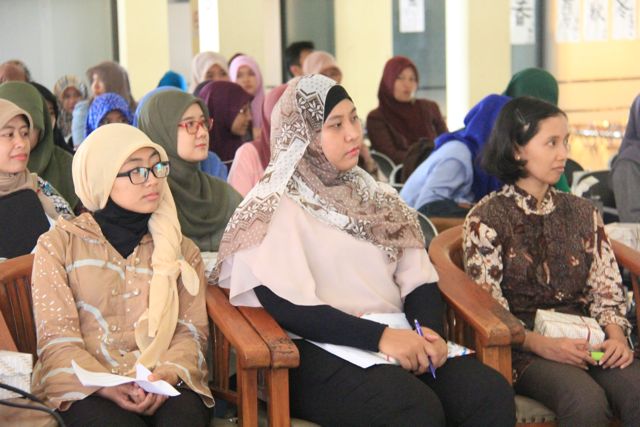
Advancing the second year of the establishment of Japanese Education Departments of Universitas Muhammadiyah Yogyakarta (PBJ UMY), PBJ commemorated the second anniversary. This second anniversary was different from the previous one. PBJ’s lecturers, in this anniversary, presented research findings dealing with phonology and sociolinguistics to PBJ’s students. The studies were employed to give recommendation in learning process at PBJ UMY. Additionally, these researches would be valuable to enhance students’ knowledge regarding Japanese culture and pronunciation.
The investigations were carried out by four lecturers of PBJ who were Rosi Roasiah, S.Pd., Sonda Sonjaya, S.S., M.Pd., Thamita Islami Indraswari, S.S., M.Pd., and Yuli Wahyuni, S.Pd., M.Pd. The studies were also supported and assisted by students. “Conducting the researches, those four lecturers took the sample of the first semester students of PBJ,” explained Ikhwanul Muslimin, the chief, in the opening of the second anniversary on Saturday (27/2) in Unires Putri UMY.
There are two focuses were examined by the lecturers of PBJ UMY, phonology and sociolinguistics. In the phonology aspect, the study concerned with Japanese pronunciation since Indonesian occasionally pronounces differently from Japanese. If it took place endlessly and was not improved, it would get into a mess of the interlocutors, moreover when talking to Japanese. If we were accustomed to use Japanese incorrectly, it would be difficult to improve. Thus, it was suggested improving Japanese pronunciation as early as possible.
In the research focusing on phonology, Yuli Wahyuni, S.Ps., M.Pd. and Rosi Roasiah, S.Pd. implemented learning system of Shadowing. It refers to how students could scrutinize the proses management in active micro level. There are three applied shadowing models which are complete shadowing (a listener imitates all statements of the speaker), selective shadowing (a listener selects essential words or phrases to imitate), and interactive shadowing (a listener gives questions and comments so that there would be two-way discussion).
In the other similar occasion, Rosi Roasiah, S.Pd. stated that the sample was 48 first semester students of PBJ. “We conducted 10 experiments in 30 minutes. Then, students would listen to an audio and imagine the audio. There were 20 vocabularies for the students consisting of 10 Hiragana vocabularies and 10 Katakana vocabularies in each meeting,” she expounded.
The findings revealed that the easy pronunciation to govern was vocabularies which had already been known by students and has the same pronunciation characteristics. On the other hand, the difficult pronunciation was vocabularies which had just now been known by students and has different pronunciation from Indonesia vocabularies. “Many vocabularies have different meaning, yet students sometimes think that they have the same meaning,” told Yuli Whyuni, S.Pd., M.Pd.
Bedsides the research of phonology, Sonda Sonjaya, S.S., M.Pd., and Thamita Islami Indraswari, S.S., M.Pd. also conducted a study of sociolinguistics. The sociolinguistics concerned with how we could recognize Japanese culture and behavior. “Japanese customs must be different from Indonesian customs. It could be noticed from Japanese behavior to do something. For instance, when Japanese needs assistance, there is the language use in order that the sentence does not sound command,” conveyed Sonda Sanjaya, S.S., M.Pd.
Sonda Sonjaya, S.S., M.Pd., and Thamita Islami Indraswari, S.S., M.Pd looked at how far students could comprehend Japanese behavior and customs. For example, when students borrowed and returned books, it would be witnessed how students applied Japanese custom. “The finding was fifty-fifty since some students have not understood yet Japanese custom in behaving,” stated Thamita.
Besides conducting a seminar and presenting research findings, in this anniversary it would be performed entertainment held at 6 in the evening from several organizations in Student Organization of Department of PBJ, Nikigakka (Nihon Kyoiku Gakusei Kai). “The organizations that would perform are Ongaku kai (Music Club), Odori Kai (Dance Club), Ryori Kai (Cooking Club), dan Shuji Kai (Calligraphy Club). Additionally, there would be lecturers telling the history of establishment of PBJ at UMY,” uttered Ikhwanul Muslimin.
Ikhwanul expected that students could acknowledge and understand more the differences of Japanese sociolinguistics and phonology. Furthermore, he also wished that PBJ would be more familiar in society. “It is in line with the theme of this second anniversary which is Utsukushiku Kagayaku meaning beautiful and shining, and this second anniversary could be a media to promote PBJ itself,” he continued.






